The cycle of poverty affects college students. Imagine student Jack from a lower income family and student Sue from a middle-income family. They are not real students, but their stories capture the reality of too many I have encountered in my decade of teaching.
Jack’s lower class background meant he began college with financial debt. He had to take out loans to cover tuition. He struggled to pay his college bills on time so took a part-time job to help cover his costs. Being from the lower class, Jack also had an academic debt. He grew up in a poor neighborhood that, unsurprisingly, had a weak tax base. The result was that there was little money for the school, and instruction was weak. He came to college unprepared.
This academic debt showed up early with some low and failing grades. Bad grades can get students expelled from school, leaving them with financial debt and no credentials. It can also mean that students have to spend more time in school, accumulating more debt, because they have to repeat classes. Jack was affected another way. Struggling to pay the bills and behind in credits, he was unable to register until everyone else had already done so. The resulting situation meant he had to take whatever he could get so that he could remain a fulltime student and thus eligible for loans and financial aid. His schedule ended up as a mixture of classes that were not required, uninteresting, offered at times that complicated his part-time work (which was necessary to pay for college) and taught by professors with little sympathy for his situation.
Jack increasing felt alone, a loss of social capital. He was working when his peers were hanging out or participating in sports or clubs. He found it difficult to study with others because of his time, because he did not know people in the courses he ended up in, and because he did not feel smart. Having little social support, Jack slowly withdrew from the college community.
Sue’s financial situation was a bit different coming from the middle-class. Her parents faced a choice of living in a poor neighborhood and sending her to a Catholic high school or living in a better neighborhood with a good public school. Either option would have overextended their budget, but they opted for the better neighborhood and public school even though they could barely afford their house and its property taxes. Sue took out loans to cover college tuition and came to college in financial debt like Jack.
Sue had good academic preparation but also came with pressure to major in a field that would be lucrative. The pressure was more from herself than her parents. She saw how her parents had sacrificed to make ends meet and did not want to further burden them. She pursued a politics degree in hopes of going to law school, even though she was not really interested in either. She struggled to study and do well but became depressed about her classes and lack of success. Her first semester was weak, and her second semester was weaker. She wanted to change majors but believed her parents would be disappointed because they were so excited when she told them she wanted to be a lawyer. She slowly lost ground and accumulated academic debt.
She also became isolated. She did not tell her parents about her struggles. She was disconnected from her peers because they were doing well and she was not. She was embarrassed by her lack of success, a feeling exacerbated by the fact that she did well in high school. Like Jack, Sue slowly disengaged from the college community, having accumulated financial, academic, and social debt. The temptation is to quit. The situation seems intractable and failure like a foregone conclusion.
This situation would be disheartening, if I did not know of my college’s attempts to address these situations, mainly through the Dean of Studies and the Opportunity Program.
The first problem is finding students who are disengaged. The Dean and the Opportunity Program encourage faculty to complete early alert forms to report problems with students at any point in the semester. If students miss two classes in a row, they ask faculty to either check with the student or report the absences to the Dean of Students so someone in her office can check in on the student. Faculty are required to submit mid-term grades that, while they carry no official weight, help to identity students who are struggling in one or more classes.
This is only the first step though. Once Sue and Jack have been identified, the Opportunity Program takes action. They have dealt with situations like Sue’s and Jack’s before and know what possibilities are available. They know how the college works and have connections with almost every office and professor on campus. They are rich in social capital and put it to work on behalf of these students.
For Jack, the Opportunity Program lets him know about emergency funds available for students struggling to pay the bills. It connects him with on-campus jobs more amenable to students’ lives. The program calls up professors to explain Jack’s situation and asks for assistance in getting him into the right classes. Professors who are eager to help but often don’t know how are thankful for the guidance and do their part to get Jack into the needed classes. The Opportunity Program also connects Jack with tutors to help him succeed in his classes and maps out a plan for coming out of his academic debt (usually including retaking failed classes and finding an appropriate major and advisor). This personal investment draws Jack back into the college, gets him into a program where he can succeed academically and feels engaged in the community.
The response to Sue is similar. The early alerts come in, and the Dean of Studies and the Opportunity Program get to work. They advise Sue on her course of study, finding out what she is interested in, what she should major in, and, by putting her in touch with the chair of the department, finds out what jobs are possible with this major. The stress of finding a job after college is alleviated, at least enough so that Sue feels comfortable changing majors and telling her parents. The Opportunity Program then walks her through strategies to alleviate the effects of her poor grades on her GPA. It is like academic debt forgiveness in a way and gives Sue the motivation to reengage. In a major she likes and with the assurance that people at the college care about her well being, she has a better chance of building the social and academic capital to succeed in college.
These, of course, are the best results. Students must take responsibility for their actions and advantage of the possibilities provided by the Dean of Studies and the Opportunity Program. Without student cooperation, their efforts cannot succeed. Perhaps one of the most challenging problems is the financial debt. Every college is trying to figure out how to lower their costs while still being able to pay their bills, and, until there is a solution, students can get into serious financial debt that the good will of people working for the institution cannot easily address. Working within these constraints, the Dean of Studies and the Opportunity Program know that the best chance of overcoming the financial debt is to ensure graduation and a job afterwards. Thus, so much effort is put on helping students to succeed in their classes and find majors that work for them.
I imagine most Catholic colleges and universities have similar offices and processes to address these issues. I think we should hear more about these efforts (Hint: there is a comments section below). A greater awareness of this kind of work on Catholic campuses enables them to do their work more effectively. Students know there is help when they get stuck, when they feel the institutional forces are conspiring against them. They realize that they have an advocate that has the desire and capital necessary to help them.
This is, of course, a bit of praise for colleagues of mine. As I watch them do their work, I cannot help but think that they are one of the most profound embodiments of Catholic identity because their work is an active and effective love of the poor and vulnerable amongst us.




When I flunked out of a Catholic university as a junior my financial debt has prevented me from reentering the education system. My former college’s career center told me I should apply at a warehouse or temp agency. The debt trap of student ‘s who fail to graduate is very real. We need services for drop-outs that can get them into a living wage so they can save money and return to college with financial stability.